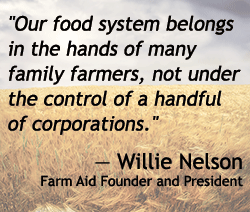 This week marks the 100th anniversary of the passage of the Clayton Antitrust Act. Don’t yawn just yet, farm friends, for as the saying goes: those who don’t know history are doomed to repeat it.
This week marks the 100th anniversary of the passage of the Clayton Antitrust Act. Don’t yawn just yet, farm friends, for as the saying goes: those who don’t know history are doomed to repeat it.
The Clayton Act was written during the Progressive Era to curb the growth of corporate power. At that time, at the turn of the 20th century, there were a flurry of mergers and takeovers, which led to corporate trusts abusing consumers, farmers and workers.

As consumers in 21st century America, we’re almost numb to headlines about mergers in the marketplace. I’m no different, though my ears do perk up when it comes to big moves in the food and agriculture world.
That’s because I see the consequences of corporate power in our food system everyday. When Farm Aid’s Farm Advocate Joel Morton answers a call on the 1-800-FARM-AID hotline from a distressed poultry farmer who was dropped by a major integrator with no notice, I know his story is intricately connected to the unchecked power of the Tysons and Purdues of the world. When I chat with a corn and soybean farmer at a convention and they tell me they don’t want to use GMO seeds, but literally have no other option in their part of Illinois, I know his plight is tied to the control that biotech behemoths like Monsanto and Dupont can exert over the seed market.
Our friends at Food & Water Watch recently posted an article covering the state of merger affairs on the heels of the Clayton’s Act’s centennial. As they point out, only the smallest sliver of proposed mergers get examined by the Department of Justice and Federal Trade Commission these days. In 2013 alone, more than 300 mergers occurred in the food and grocery sector and nearly all of them were rubber stamped by our government. That includes the controversial takeover of Smithfield Foods by China’s largest meatpacker – Shuanghui International – a deal that received no official investigation at all, even though it has major implications not only for farmers’ and eaters’ choices in the marketplace, but also the safety and integrity of our food.

These issues aren’t always the easiest to explain or talk about, but they hit at the root causes of the injustices and damaging trends we see in our food system. From seed to plate, corporate power is the dirty little secret that prevents real change in our food system.
Stay tuned for opportunities to bring people power – not corporate power – back to our food system. And in the meantime let us know what you think: what do we need to really change the state of affairs in our fields and on our plates?



